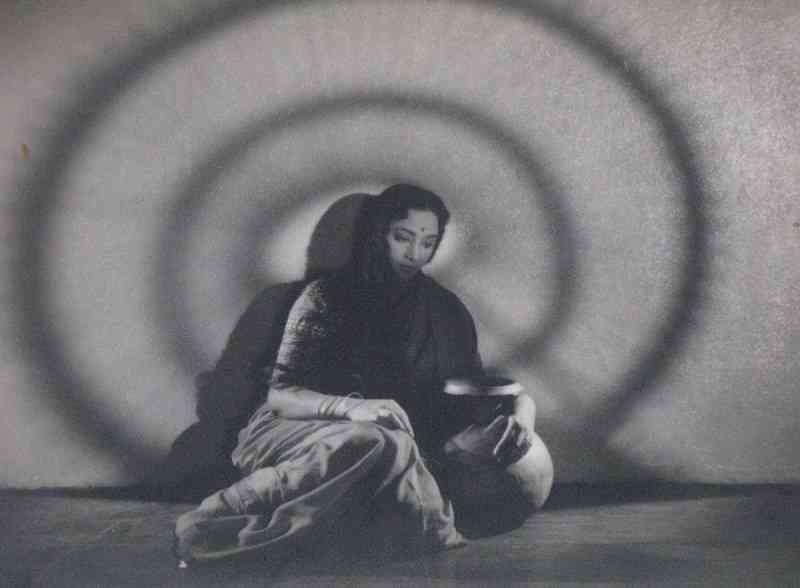One of these aborted projects was Gouri, launched in 1957. Guru Dutt Films Private Limited, fresh from the success of Pyaasa that year, announced a film in Bengali and English. Gouri was to have been directed by Guru Dutt and was billed as the acting debut of his wife, playback singer Geeta Dutt.
Gouri was set in the director’s favorite city, Kolkata. The plot revolves around a successful sculptor of Durga idols who meets a prostitute, who, to him, resembles the goddess. Moved by the woman’s plight, he marries her. They lead a blissful life until one of his friends starts blackmailing him. When his parents find out about their daughter-in-law’s past, they start mistreating her. The woman runs away.
Two scenes were filmed and music director SD Burman had recorded two songs when Guru Dutt stopped production.
Had Gouri been made, it would have been India’s first film in the Cinemascope format, rather than his Kaagaz ke Phool two years later.

Gouri was one of Guru Dutt’s many incomplete projects. Nasreen Munni Kabir suggests in her biography Guru Dutt: A Life in Cinema that this indicated “an increasingly disillusioned and fractured state of mind”. Kabir writes, “Guru Dutt’s personal life was in turmoil, and he smoked and drank heavily.” This is borne out by lyricist Kaifi Azmi, who wrote the lyrics for 1959’s Kaagaz ke Phool. Azmi is quoted in the biography as saying, “What he wanted to say in the film [Kaagaz ke Phool] wasn’t clear. His mental state was like that, he wasn’t clear... There were more scenes that were edited out than remained in the completed film.”
Even as Kaagaz ke Phool was underway, Guru Dutt set his assistant, Niranjan, off on another project. The intended film, Raaz, was adapted from the Wilkie Collins classic tale The Woman in White. The film starred Sunil Dutt as an army doctor and Waheeda Rehman in the double role of twins.
Raaz moved in fits and starts, and Guru Dutt eventually replaced Sunil Dutt as the lead. Some scenes were shot in Shimla and two songs were recorded by composer RD Burman, who was making his debut. One track featured three dancing girls and was sung by Geeta Dutt, Asha Bhosle, and Shamshad Begum. But after shooting and editing five or six reels, Guru Dutt shelved the film since he was unhappy with the way it was shaping up.

According to Dutt’s other brother, Devi Dutt, Guru Dutt offered Niranjan another film after the Raaz debacle, titled Moti Ki Mausi and starring Tanuja and future scriptwriter Salim Khan. Moti Ki Mausi hit a wall after Niranjan died from alcohol-related complications.
Some of the projects did finally make it to the theatres with other producers, actors and directors. Professor (1962) was first announced by Guru Dutt a couple of years earlier as a story of a man too young to be a teacher and too old to love. It was to have been directed by Shashi Bhushan with Kishore Kumar and Waheeda Rehman in the leads. Dutt even asked Abrar Alvi to direct the film, but Alvi declined.
Alvi did, however, write the screenplay for the movie, which was eventually made by Lekh Tandon with Shammi Kapoor. Raj Khosla, Guru Dutt’s former assistant, re-worked the shelved Raaz as Woh Kaun Thi? in 1964 with Manoj Kumar and Sadhana.
Sadhana was also supposed to have starred in Picnic, with Guru Dutt. The project was to have been directed by RS Tara, with music by N Dutta. Unlike the other incomplete films, of which nothing remains because of our tragic ignorance of the importance of archiving and preservation, snippets of two songs from Picnic have survived. One is this lovely duet sung by Mohammed Rafi and Asha Bhosle.
Following the critically acclaimed Sahib Bibi Aur Ghulam (1962), Guru Dutt attempted an Arabian Nights-style adventure, which was to have been his first film in colour. In an essay titled Classics and Cash, Guru Dutt recalled the shock when he announced Kaneez sometime in 1962 or 1963. “I have been trolled by friends and critics for taking up Alibaba as my next film,” he wrote. “‘From a provocative social theme to Arabian Nights? What a fall, Guru!’ they kept on twitting me. I have to explain every time that I want to show that even Alibaba could be a subject with contemporary significance.
Kaneez was to have starred Simi Garewal. But this one also failed to make it to the finishing line and was shelved after initial filming. Garewal complained to the Cine Artists Association and ensured that she recovered her dues.

The two films that Guru Dutt left unfinished at the time of his sudden death on October 10, 1964, were his own production, Baharen Phir Bhi Aayengi, and K Asif’s magnum opus, Love and God, an epic take on the Laila-Majnu tale starring Guru Dutt as Majnu and Nimmi as Laila. Dharmendra stepped into Baharen Phir Bhi Aayengi.
If you liked this blog, you would also like my Youtube channel, the link is given below

